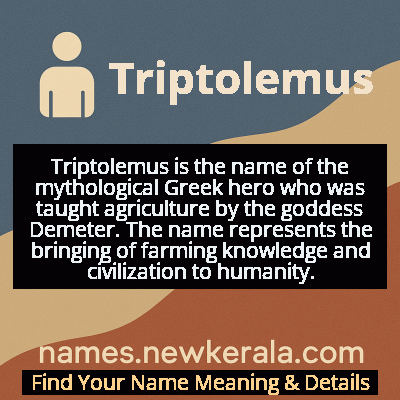Triptolemus Name Meaning & Details
Origin, Popularity, Numerology Analysis & Name Meaning of Triptolemus
Discover the origin, meaning, and cultural significance of the name TRIPTOLEMUS. Delve into its historical roots and explore the lasting impact it has had on communities and traditions.
Name
Triptolemus
Gender
Male
Origin
Greek
Lucky Number
6
Meaning of the Name - Triptolemus
Triptolemus is the name of the mythological Greek hero who was taught agriculture by the goddess Demeter. The name represents the bringing of farming knowledge and civilization to humanity.
Triptolemus - Complete Numerology Analysis
Your Numerology Number
Based on Pythagorean Numerology System
Ruling Planet
Venus
Positive Nature
Harmonious, responsible, caring, and artistic.
Negative Traits
Overly idealistic, superficial, possessive, or jealous.
Lucky Colours
Pink, turquoise.
Lucky Days
Friday.
Lucky Stones
Diamond, turquoise.
Harmony Numbers
2, 3, 9.
Best Suited Professions
Artists, musicians, teachers, healthcare workers.
What People Like About You
Warmth, nurturing nature, artistic flair.
Famous People Named Triptolemus
Triptolemos of Eleusis
Mythological Hero
First mortal taught agriculture by Demeter, credited with spreading farming civilization across Greece
Triptolemus (Artisan)
Ancient Greek Sculptor
Created renowned bronze statues and was mentioned by ancient writers for his artistic contributions
Triptolemus (Historical Figure)
Eleusinian Priest
Served as a high priest in the Eleusinian Mysteries, maintaining the sacred traditions associated with Demeter
Name Variations & International Equivalents
Click on blue names to explore their detailed meanings. Gray names with will be available soon.
Cultural & Historical Significance
In Athenian tradition, he was particularly revered as the founder of agriculture in Attica, and his image frequently appeared in art and literature as a young man riding a winged chariot drawn by dragons, spreading seeds across the earth. The Triptolemus myth served to explain and sanctify the agricultural practices that formed the basis of Greek society, while also embodying themes of divine favor, cultural transmission, and human progress. His role in mythology established him as a patron of civilization itself, with his journey across the world representing the spread of Greek culture and agricultural technology.
Extended Personality Analysis
Individuals named Triptolemus are typically associated with traits of wisdom, generosity, and a pioneering spirit. Like the mythological figure who spread agricultural knowledge across the ancient world, they often exhibit a strong desire to share knowledge and improve the lives of others. They tend to be patient teachers and innovators, possessing the determination to overcome obstacles in pursuit of their goals. Their personality often combines practical wisdom with visionary thinking, enabling them to bridge traditional knowledge with new ideas.
They are generally seen as reliable, methodical individuals who understand the importance of gradual progress and cultivation, whether in personal relationships or professional endeavors. The name suggests someone who values growth, sustainability, and the careful nurturing of projects and relationships over time, reflecting the agricultural metaphors inherent in the original myth. These individuals often display a natural authority and are respected for their expertise, much like the mythological Triptolemus who was entrusted with transforming human civilization through his specialized knowledge.
Modern Usage & Popularity
In contemporary times, Triptolemus remains an extremely rare given name, primarily used by classical scholars, mythology enthusiasts, or parents seeking a distinctive name with deep historical roots. Its usage is almost exclusively confined to Greece and academic circles, with virtually no presence in modern baby name statistics. The name's complexity and strong mythological associations make it challenging for everyday use in most cultures. However, it occasionally appears in literary works, artistic references, and among families with strong connections to classical studies or Greek heritage. The name's rarity ensures that any modern bearer would immediately stand out and likely face questions about its origin and meaning, making it a choice for those who value uniqueness and classical education over conventional naming practices.
Symbolic & Spiritual Meanings
Triptolemus symbolizes the transmission of divine knowledge to humanity, representing the bridge between celestial wisdom and earthly application. As the mythological bringer of agriculture, he embodies themes of civilization, progress, and the nurturing of life. The name carries connotations of mentorship, as he was taught by Demeter herself, and then became a teacher to all humanity. Symbolically, Triptolemus represents the careful cultivation of both land and knowledge, the patience required for growth, and the responsibility that comes with receiving and sharing transformative gifts. His winged chariot journey across the world symbolizes the spread of civilization and the interconnectedness of human communities through shared knowledge and practices, making him an enduring symbol of cultural exchange and human advancement.

